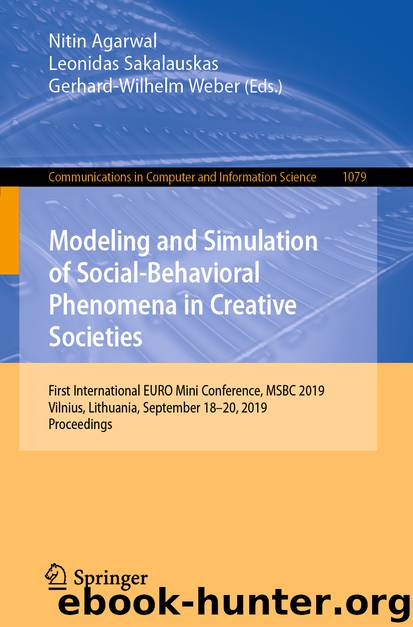Modeling and Simulation of Social-Behavioral Phenomena in Creative Societies by Nitin Agarwal & Leonidas Sakalauskas & Gerhard-Wilhelm Weber

Author:Nitin Agarwal & Leonidas Sakalauskas & Gerhard-Wilhelm Weber
Language: eng
Format: epub
ISBN: 9783030298623
Publisher: Springer International Publishing
Fig. 4.Box plot of the number of dependent scientists as a function of the proportion of independent researchers in the model.
Fig. 5.Box plot of the number of research projects that won the competition, as a function of the proportion of independent researchers in the model.
According to Fig. 4, with initial values of the independent researchers representation spanning 10% to 40% of the total number of researchers, there is a tendency for independent researchers to become dependent. Upon completion of 100-time cycles, between 95% and 100% of researchers belong to the dependent class. A similar situation is observed with initial values of the independent researchers share of representation equal to from 60% to 90%. In this case, the reverse trend is visible - dependent researchers gravitate toward the independent category. By the completion of 100-time cycles, between 90% and 100% of researchers belong to the independent class.
Most compelling in these interactions is the range where the representation of dependent researchers and independent researchers equal to 50%. We identify that when starting from equal positions in terms of representative share, dependent researchers have an advantage over independent researchers. The median value indicates that upon the completion of 100-time cycles, 70% of researchers are in the class of dependent ones, with total fluctuations from 45% to 90%. Accordingly, it can be concluded that there is no parity between dependent and independent researchers, despite having established equal conditions before the start of the simulation cycle.
We can draw the following conclusion based on Fig. 5. Dependent researchers dominate in the scientific community (from 60% to 90%), and about 33 research projects per 1000 researchers win in the competition at each slot. In a situation where independent researchers dominate in the scientific community (from 60% to 90%), on average, about 11 research projects per 1000 researchers win in the competition at each slot. This result indicates that independent researchers carry out a more qualitative and tough examination compared with dependent researchers, and support 3 times less research projects. Thus, we can conclude that the scientific projects examination conducted by independent researchers contributes to a more rational distribution of scientific foundations.
Download
This site does not store any files on its server. We only index and link to content provided by other sites. Please contact the content providers to delete copyright contents if any and email us, we'll remove relevant links or contents immediately.
Algorithms of the Intelligent Web by Haralambos Marmanis;Dmitry Babenko(17465)
Jquery UI in Action : Master the concepts Of Jquery UI: A Step By Step Approach by ANMOL GOYAL(9970)
Test-Driven Development with Java by Alan Mellor(7749)
Data Augmentation with Python by Duc Haba(7624)
Principles of Data Fabric by Sonia Mezzetta(7392)
Learn Blender Simulations the Right Way by Stephen Pearson(7306)
Microservices with Spring Boot 3 and Spring Cloud by Magnus Larsson(7155)
Hadoop in Practice by Alex Holmes(6685)
RPA Solution Architect's Handbook by Sachin Sahgal(6530)
The Infinite Retina by Robert Scoble Irena Cronin(6231)
Big Data Analysis with Python by Ivan Marin(5953)
Life 3.0: Being Human in the Age of Artificial Intelligence by Tegmark Max(5534)
Pretrain Vision and Large Language Models in Python by Emily Webber(4914)
Infrastructure as Code for Beginners by Russ McKendrick(4667)
Functional Programming in JavaScript by Mantyla Dan(4502)
WordPress Plugin Development Cookbook by Yannick Lefebvre(4404)
The Age of Surveillance Capitalism by Shoshana Zuboff(4267)
Embracing Microservices Design by Ovais Mehboob Ahmed Khan Nabil Siddiqui and Timothy Oleson(4160)
Applied Machine Learning for Healthcare and Life Sciences Using AWS by Ujjwal Ratan(4149)
